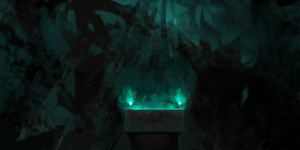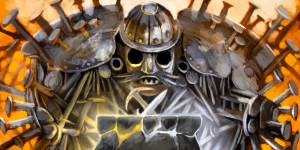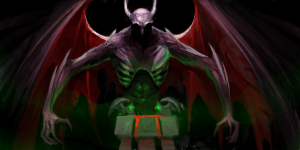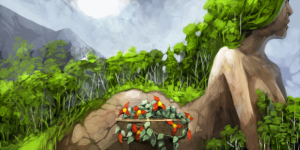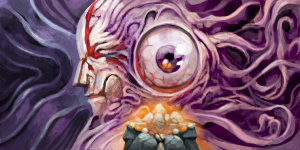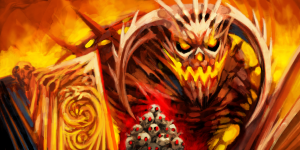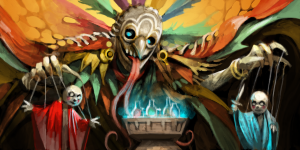Gods
Gods work similarly to other roguelike games, each giving themed bonuses and penalties. While some penalties are more trivial to avoid or withstand than others, every god has the ability to substantially improve a dungeon run given proper planning. When you play with gods, however, you play with fire — it is up to the player to wield it against the enemy rather than against herself in the form of harsh and avoidable punishments.
All classes except for ![]() Goatperson begin without a religion, and must visit an altar to join a religion (except for
Goatperson begin without a religion, and must visit an altar to join a religion (except for ![]() Vampire, who cannot join a religion). Each dungeon has up to three altars, each assigned to a randomly-selected god among those unlocked. Stepping on the altar will display a brief flavor text description and the option to begin worship if you have not selected a god yet. It is also possible to change religions mid-run through the (religious) Conversion mechanic (explained below), allowing the player to take boons from multiple gods while avoiding penalties.
Vampire, who cannot join a religion). Each dungeon has up to three altars, each assigned to a randomly-selected god among those unlocked. Stepping on the altar will display a brief flavor text description and the option to begin worship if you have not selected a god yet. It is also possible to change religions mid-run through the (religious) Conversion mechanic (explained below), allowing the player to take boons from multiple gods while avoiding penalties.
Relatively new players can experiment with gods in a punishment-free setting using a ![]() Paladin, once unlocked. Intermediate-to-advanced practice with gods can be had by using the challenging
Paladin, once unlocked. Intermediate-to-advanced practice with gods can be had by using the challenging ![]() Goatperson class, whose mandatory polytheism forces the player away from comfort picks and instead teaches them how to plan actions around religious conversions.
Goatperson class, whose mandatory polytheism forces the player away from comfort picks and instead teaches them how to plan actions around religious conversions.
Some lesser divinities can infrequently be encountered in subdungeons. These only differ from other subdungeons thematically, as they do not otherwise function as a god in the same broad mechanical sense as the 9 major deities.
Contents
Piety and Altars
Piety is the spiritual equivalent of gold. You start with 0 Piety, and can never have less than 0. You can never have more than 100 Piety saved up, so any gains beyond this are wasted.
The number of altars in a standard dungeon depends on your kingdom. Initially, no altars will spawn. Occasionally, the player will find a subdungeon with a particular challenge; this challenge, when conquered, will convert the player to the god they just discovered (even if they were already worshipping another one) and allow this god's altars to spawn in any dungeon. Altars will spawn based on the amount of gods you've unlocked. If you have 1-3 gods, one altar will spawn. With 4-8 gods, two altars will spawn. If you unlock your ninth god, you will have all three altars spawn.
Each altar has a 3x3 square of sparkles centred on it, coloured-coded according to the deity of the altar. You should learn the colours, as these give advance notice of which deity is present. Each sparkle disappears when stepped on, giving +1 piety (regardless of your current religious status).
If you are currently following a god, you can desecrate the altar of any other god (except for the Pactmaker's altar, which can never be desecrated). Doing so gains 30 piety (-10 for each subsequent desecration) and three indulgences, but you will suffer a punishment from the god whose altar you smashed, and the smashed altar will become unusable. The punishments vary from irrelevant to disastrous depending on the god and your overall strategy.
The principal way to gain piety is by performing actions your current god approves of. If you perform a disapproved action, however, your god will 'fine' you a certain amount of piety. If you have indulgences, he/she will take off one of those in preference to fining you in piety, so it's a good idea to time your desecrations so that the indulgences allow you to avoid heavy fines. If you do not have any indulgences, nor enough piety to pay the fine, you will suffer your god's punishment (the ![]() Paladin is exempt from this).
Paladin is exempt from this).
The Pactmaker uses Piety a little differently from the other gods. Whenever you perform the action associated with your Pact, the Pactmaker will try to take away the necessary Piety and give you the associated benefit. If you cannot afford the Piety cost, the Pactmaker won't deduct any piety and won't give you the benefit, but there is no punishment and the Pact remains active.
You must return to your god's altar in order to request boons from them. On some maps, you will need to be careful about getting cut off from the altar.
Initial worship and conversion
You can only follow one god at a time, and at the start, you are not following any god. (Note: The Pactmaker cannot be followed, but you can take one of its Pacts regardless of whether or not you are following a god.)
If you are not currently following any god, you can start following a god at his/her altar. Depending on the god, you will receive an initial worship bonus in the form of piety and sometimes a free glyph.
If you are already following a god, and you are not a ![]() Paladin or
Paladin or ![]() Goatperson, you can convert to another god with an intact altar (even a god you previously abandoned). You need at least 50 piety in the bank to convert, and you lose half of whatever you have when you convert. Converting does not give any of the initial worship benefits.
Goatperson, you can convert to another god with an intact altar (even a god you previously abandoned). You need at least 50 piety in the bank to convert, and you lose half of whatever you have when you convert. Converting does not give any of the initial worship benefits.
Main Gods
Initial WorshipN/A PunishmentN/A Preparation PenaltyN/A |
Likes | Dislikes | Boons |
|---|---|---|---|
|
None |
None |
|
Initial Worship
Punishment
Preparation Penalty
|
Likes | Dislikes | Boons |
|---|---|---|---|
|
|
|
Initial Worship
Punishment
Preparation Penalty
|
Likes | Dislikes | Boons |
|---|---|---|---|
|
|
|
Initial Worship
Punishment
Preparation Penalty
|
Likes | Dislikes | Boons |
|---|---|---|---|
|
|
|
Initial WorshipPunishment
Preparation Penalty
|
Likes | Dislikes | Boons |
|---|---|---|---|
|
|
|
Initial Worship
Punishment
Preparation Penalty
|
Likes | Dislikes | Boons |
|---|---|---|---|
|
|
|
Initial WorshipPunishment
Preparation Penalty
|
Likes | Dislikes | Boons |
|---|---|---|---|
|
|
Initial WorshipPunishment
Preparation Penalty
|
Likes | Dislikes | Boons |
|---|---|---|---|
|
Kill a Convert a glyph: +10 |
Convert Taurog's Equipment: Instant punishment. |
|
Initial Worship
Punishment
Preparation Penalty
|
Likes | Dislikes | Boons |
|---|---|---|---|
|
|
Choose your Deity
 Binlor Ironshield: Binlor works as a source of knockback melee damage, temporary physical damage resistance, and permanent magic damage resistance, and is quite easy to farm piety with. He grants a free
Binlor Ironshield: Binlor works as a source of knockback melee damage, temporary physical damage resistance, and permanent magic damage resistance, and is quite easy to farm piety with. He grants a free  PISORF on worship, which also makes him a popular "glyph magnet" as a preparation. You can also get
PISORF on worship, which also makes him a popular "glyph magnet" as a preparation. You can also get  ENDISWAL from him for 35
ENDISWAL from him for 35  , or can pick one up if it spawns — or you can prep
, or can pick one up if it spawns — or you can prep  Bear Mace to help farm his piety. Constantly requesting
Bear Mace to help farm his piety. Constantly requesting  Stone Skin and/or
Stone Skin and/or  Stone Heart will allow you to rack up a great amount of magic resistance. Binlor is also a good desecration target, as long as you don't care about your resistances, and if you're going to spam
Stone Heart will allow you to rack up a great amount of magic resistance. Binlor is also a good desecration target, as long as you don't care about your resistances, and if you're going to spam  Stone Skin, you don't mind his punishment even if you're worshiping him.
Stone Skin, you don't mind his punishment even if you're worshiping him. Dracul: Dracul is a good selection for most melee classes, due to how much health refills he can bring to the table. He can grant you
Dracul: Dracul is a good selection for most melee classes, due to how much health refills he can bring to the table. He can grant you  Life steal,
Life steal,  Sanguine, or even a full heal via
Sanguine, or even a full heal via  Blood Swell. Unfortunately, he doesn't really like you using other forms of healing, like
Blood Swell. Unfortunately, he doesn't really like you using other forms of healing, like  HALPMEH or
HALPMEH or  CYDSTEPP — it takes a bit of practice to combine him with folks who like to use those. He doesn't like you using healing potions, either, but he likes you converting those, which paradoxically makes him a fine Deity for
CYDSTEPP — it takes a bit of practice to combine him with folks who like to use those. He doesn't like you using healing potions, either, but he likes you converting those, which paradoxically makes him a fine Deity for  Halfling if you want quick piety with him (great for a Halfling
Halfling if you want quick piety with him (great for a Halfling  Feeling Parched). The other reason he's useful is for if
Feeling Parched). The other reason he's useful is for if  Blood Shield, which stacks extremely well with other forms of damage resistance while not taking up an item slot, and he's a key player in resist stacking strategies. Both glass cannon builds and big health builds can make good use out of overhealing with his lifesteal, too, and
Blood Shield, which stacks extremely well with other forms of damage resistance while not taking up an item slot, and he's a key player in resist stacking strategies. Both glass cannon builds and big health builds can make good use out of overhealing with his lifesteal, too, and  Dwarf can get great mileage out of everything he provides.
Dwarf can get great mileage out of everything he provides. The Earthmother: A very useful deity whatever your plan is, and a great source of piety. Her free
The Earthmother: A very useful deity whatever your plan is, and a great source of piety. Her free  IMAWAL glyph will both give you piety and help you level up faster, and
IMAWAL glyph will both give you piety and help you level up faster, and  Vine Form will let you get more out of the XP bonus by letting you fight higher level enemies with less effort.
Vine Form will let you get more out of the XP bonus by letting you fight higher level enemies with less effort.  Plantation allows you to get 100
Plantation allows you to get 100  extremely easily, and also allow for seemingly endless spam of
extremely easily, and also allow for seemingly endless spam of  Clearance, which can be an equivalent to having several
Clearance, which can be an equivalent to having several  Keg of Mana. It can also be used to convert to another deity.
Keg of Mana. It can also be used to convert to another deity.  Entanglement is multi purpose — bonus experience on every monster, protection from enemy first strike and retaliation, and it's cheap to spam just to put plants on the map. The Earthmother's altar is an easy desecration target, since a single
Entanglement is multi purpose — bonus experience on every monster, protection from enemy first strike and retaliation, and it's cheap to spam just to put plants on the map. The Earthmother's altar is an easy desecration target, since a single  Burn Salve negates her punishment.
Burn Salve negates her punishment. Glowing Guardian: A powerful deity for every class except
Glowing Guardian: A powerful deity for every class except  Bloodmage and
Bloodmage and  Assassin, or
Assassin, or  Trisword/
Trisword/ Alchemist Scroll builds. Worship him as early as possible to get the most piety out of him.
Alchemist Scroll builds. Worship him as early as possible to get the most piety out of him.  Absolution is deceptively powerful, allowing you to gain a ton of max HP, although it costs 1/5 of an item slot and some potential XP.
Absolution is deceptively powerful, allowing you to gain a ton of max HP, although it costs 1/5 of an item slot and some potential XP.  Enlightenment can be used to your advantage, providing a nice bonus to everything, plus a complete curse wipe. Unfortunately, he hates potions, and converting in and out of him isn't a great option. Also, he gives piety for converting things and leveling, and
Enlightenment can be used to your advantage, providing a nice bonus to everything, plus a complete curse wipe. Unfortunately, he hates potions, and converting in and out of him isn't a great option. Also, he gives piety for converting things and leveling, and  Goblins convert things for leveling, so they make ideal GG worshipers.
Goblins convert things for leveling, so they make ideal GG worshipers. Jehora Jeheyu: He rewards almost anything you do, but sometimes he will inflict a random small punishment instead until you get
Jehora Jeheyu: He rewards almost anything you do, but sometimes he will inflict a random small punishment instead until you get  Petition from him. In return for this bit of inconvenience, he provides very cheap stat boosts. Grab
Petition from him. In return for this bit of inconvenience, he provides very cheap stat boosts. Grab  Petition to end his punishments as soon as possible, and burn a potion or whatever to get to LV2 and enjoy the great boosts, quality refills, and also the handy
Petition to end his punishments as soon as possible, and burn a potion or whatever to get to LV2 and enjoy the great boosts, quality refills, and also the handy  WEYTWUT which lets you explore any map easily. Desecrating him is somewhat risky. A desecration can either severely reduce your total health, mana, and damage, or just give you free piety. Desecrate only when desperate, or feel lucky. Also a great god for a
WEYTWUT which lets you explore any map easily. Desecrating him is somewhat risky. A desecration can either severely reduce your total health, mana, and damage, or just give you free piety. Desecrate only when desperate, or feel lucky. Also a great god for a  Goblin, as they can take all his punishments at LV1 and just convert something to get rid of most of them, and they can get a lot of mileage out of his stat boosts, and you can get great mileage out of
Goblin, as they can take all his punishments at LV1 and just convert something to get rid of most of them, and they can get a lot of mileage out of his stat boosts, and you can get great mileage out of  Halflings and
Halflings and  Gnomes as well.
Gnomes as well. Mystera Annur: Mystera works well for most
Mystera Annur: Mystera works well for most  BURNDAYRAZ spellcaster builds (even when your character isn't one, because worshiping Mystera turns anyone into one).
BURNDAYRAZ spellcaster builds (even when your character isn't one, because worshiping Mystera turns anyone into one).  Magic is a free mana point, and another one each time you can afford it.
Magic is a free mana point, and another one each time you can afford it.  Refreshment provides roughly 5-6 Mana Potions worth of mana, so saving glyphs for mana replenishment is often crucial for getting the most out of her.
Refreshment provides roughly 5-6 Mana Potions worth of mana, so saving glyphs for mana replenishment is often crucial for getting the most out of her.  Mystic Balance allows for 5 MP fireballs and 8 MP CYDSTEPPs, although it fares poorly with other cheaper glyphs.
Mystic Balance allows for 5 MP fireballs and 8 MP CYDSTEPPs, although it fares poorly with other cheaper glyphs.  Flames bump your effective caster level at levels 4 and 8 for dedicated casters and
Flames bump your effective caster level at levels 4 and 8 for dedicated casters and  Weakening can fully negate one of the few obstacles to fireball spam if used a bunch. Don't worship her if the dungeon is full of magical monsters or mana burners unless you know what you're doing; in most other cases, she's supremely easy to play and powerful. Also, don't desecrate her unless you know you have a way around her punishment.
Weakening can fully negate one of the few obstacles to fireball spam if used a bunch. Don't worship her if the dungeon is full of magical monsters or mana burners unless you know what you're doing; in most other cases, she's supremely easy to play and powerful. Also, don't desecrate her unless you know you have a way around her punishment. The Pactmaker: Works differently than other deities and can be worshipped at the same time as another deity. The Pactmaker offers 5 pacts which decrease your piety, but give you god effects when certain things happen. If you cannot pay the piety because you have no other god, nothing happens. If you have a god, but can't pay the piety, you do not invoke the god's punishment. You can also use
The Pactmaker: Works differently than other deities and can be worshipped at the same time as another deity. The Pactmaker offers 5 pacts which decrease your piety, but give you god effects when certain things happen. If you cannot pay the piety because you have no other god, nothing happens. If you have a god, but can't pay the piety, you do not invoke the god's punishment. You can also use  Consensus for an instant piety boost or for converting out of another deity. Works well with "piety farms" like
Consensus for an instant piety boost or for converting out of another deity. Works well with "piety farms" like  The Earthmother and
The Earthmother and  Taurog, as well as the
Taurog, as well as the  Stone Sigil. Always keep in mind that you can't take the powerful
Stone Sigil. Always keep in mind that you can't take the powerful  Consensus if you take another pact before, but you can still take another pact if you take Consensus first.
Consensus if you take another pact before, but you can still take another pact if you take Consensus first. Taurog: Taurog is a good source of piety, and benefits classes that beg for physical damage, especially the
Taurog: Taurog is a good source of piety, and benefits classes that beg for physical damage, especially the  Berserker and the
Berserker and the  Monk. However, the mana penalty can be crippling and his boons will fill your inventory and prevent you from purchasing other items from shops. With Taurog, you can either worship him full-time and abuse
Monk. However, the mana penalty can be crippling and his boons will fill your inventory and prevent you from purchasing other items from shops. With Taurog, you can either worship him full-time and abuse  Unstoppable Fury or grab a few of his items and convert out of him before the MP penalty cripples you. He rewards converting glyphs, so front-loaded guys like
Unstoppable Fury or grab a few of his items and convert out of him before the MP penalty cripples you. He rewards converting glyphs, so front-loaded guys like  Orc, or the melee-happy
Orc, or the melee-happy  Halfling make good
Halfling make good  Warmonger melee-only builds with him because they can dump all their glyphs to get a lot of his stuff in their inventory early. He's also good for melee types going
Warmonger melee-only builds with him because they can dump all their glyphs to get a lot of his stuff in their inventory early. He's also good for melee types going  Miser as he doesn't leave too much room for other items anyway.
Miser as he doesn't leave too much room for other items anyway. Tikki Tooki: Good choice as a later game deity, as he enjoys you slaying lower level monsters, but a big no for tanks. That said, if you can just hop in with a tank and grab
Tikki Tooki: Good choice as a later game deity, as he enjoys you slaying lower level monsters, but a big no for tanks. That said, if you can just hop in with a tank and grab  Dodging and maybe a hit of
Dodging and maybe a hit of  Tikki's Edge then get out, he's great — the more hits you can tank, the more potential dodges, you just have to get out of TT worship first. His prep penalty looks harsh, but just promotes optimal play on spellcasters and glass cannon types — and
Tikki's Edge then get out, he's great — the more hits you can tank, the more potential dodges, you just have to get out of TT worship first. His prep penalty looks harsh, but just promotes optimal play on spellcasters and glass cannon types — and  Tikki's Edge stacking is great with spellcasters while each hit of
Tikki's Edge stacking is great with spellcasters while each hit of  Reflexes gives you two powerful potions almost anyone can find a use for. When playing for a lot of Tikki's Edge benefits, save some low level monsters.
Reflexes gives you two powerful potions almost anyone can find a use for. When playing for a lot of Tikki's Edge benefits, save some low level monsters.  Poison isn't particularly powerful outside of very specific builds, but the first shot basically pays for itself. A nice thing about Tikki Tooki is that his boons give you gold, so you can afford buying powerful items or potions and abusing gold-consuming items like the
Poison isn't particularly powerful outside of very specific builds, but the first shot basically pays for itself. A nice thing about Tikki Tooki is that his boons give you gold, so you can afford buying powerful items or potions and abusing gold-consuming items like the  Crystal Ball. Just don't prep him with
Crystal Ball. Just don't prep him with  CYDSTEPP users whatever you do, he doesn't like that. On plant maps, he can give you a lot of piety for dodging plant hits.
CYDSTEPP users whatever you do, he doesn't like that. On plant maps, he can give you a lot of piety for dodging plant hits.
Lesser divinities
Some other divinities can be encountered in subdungeons. You can sometimes interact, or even worship them.
- The metal spider, in the Metal Spider Temple, who will reward you if you abandon some life.
- The mighty lost Lekon, who likes you to kill goats.
